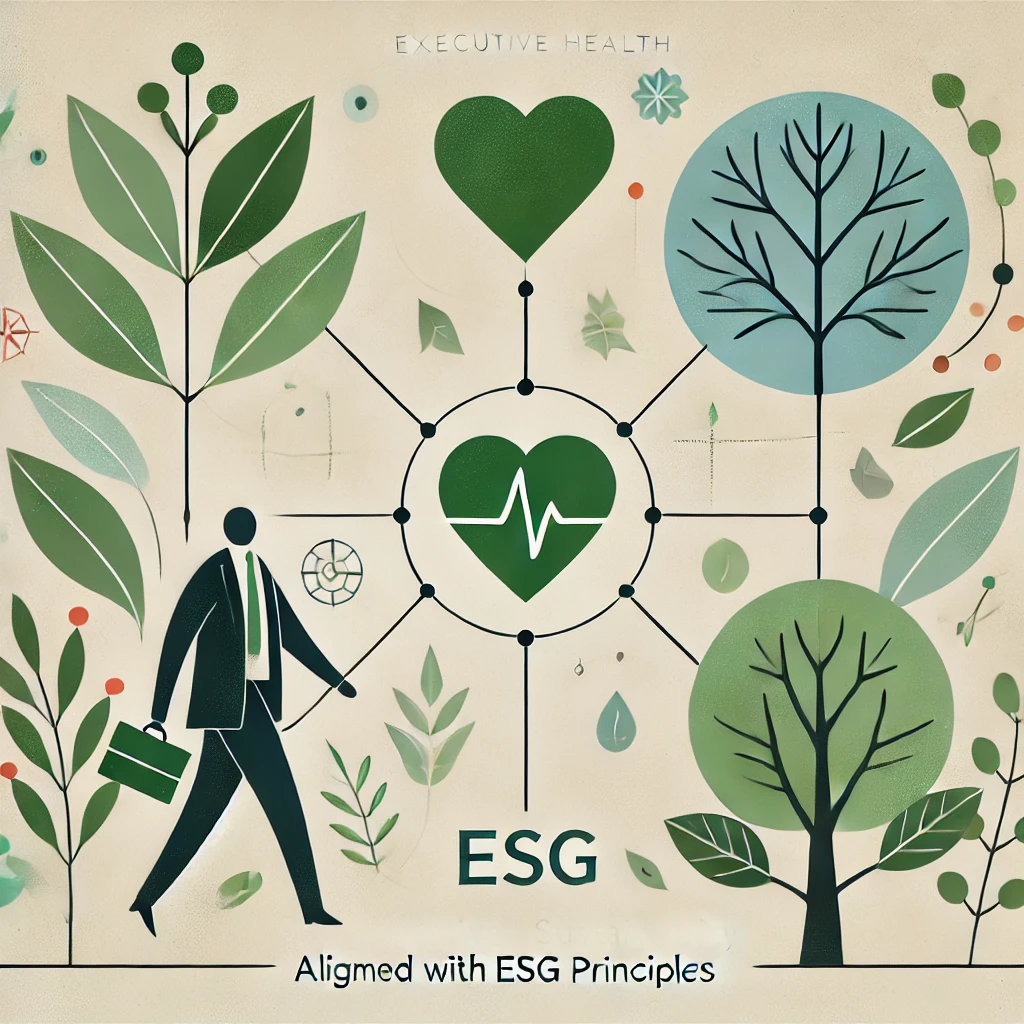Introduction:
The relationship between executive health and environmental sustainability is closer than it seems. In a world where the human impact on the environment has become increasingly worrying, the principles of ESG (Environmental, Social, and Governance) are gaining momentum. Executives, as business leaders, have the power to influence changes not only in their own lives, but also in the corporate practices they adopt. Taking care of physical and mental health and promoting sustainable practices go hand in hand.
Living healthily and sustainably means recognizing that our health is closely linked to the environment. This is reflected in the quality of the air we breathe, the food we eat, the levels of pollution we endure and even how we interact with nature. This article will explore how executives can integrate health and sustainability into their routines, promoting physical and mental well-being while supporting environmental preservation and aligning with ESG principles.
Part 1: Straight to the Point 🎯 – Basic Strategies and Practical Actions
Part 1, “Straight to the Point”, offers practical instructions and suggestions for immediate action.

Practical Tips for Executives to Align Health and Sustainability
Here are five practical tips for executives to align their personal health with environmental sustainability, improving well-being and contributing positively to the environment.
- Adopt an Outdoor Exercise Routine
- How to do it: Taking advantage of nature to stay active is an effective way to improve physical and mental health while connecting with the environment. Executives can opt for running in parks, hiking on trails or doing yoga in green areas. As well as being a form of exercise, these outdoor activities help to disconnect from everyday stress and promote a sense of renewal. If possible, make a habit of spending a few minutes outdoors every day, whether it’s a short walk during lunch or a morning meditation session in a green space.
- Why it’s important: Studies show that contact with nature has profound benefits for mental health, including reducing stress, anxiety and depression. A 2019 study published in the Journal of Environmental Psychology found that people who spend time in natural areas experience a significant improvement in mental well-being and an increased ability to cope with everyday pressures. In addition, by doing outdoor activities, executives are contributing to the reduction of carbon emissions, as they avoid using equipment that consumes electricity or motorized transport.
- Opt for Organic and Sustainably Sourced Food
- How to do it: Incorporating organic and sustainably sourced food into your daily diet is a practical way to improve your health while reducing your environmental impact. Prioritize the consumption of locally and organically produced fruits, vegetables and grains, which do not use harmful pesticides or cause soil degradation. Also, reduce your consumption of processed meats and opt for plant-based protein sources, such as legumes, which have a significantly smaller environmental footprint.
- Why it’s important: Organic food production not only benefits health by eliminating the risk of exposure to toxic substances, but also contributes to sustainability by preserving biodiversity and reducing soil and water pollution. A study by the Harvard School of Public Health showed that diets rich in vegetables and organic food are associated with a lower risk of chronic diseases such as hypertension and diabetes. By making sustainable food choices, executives not only improve their health, but also support agricultural practices that protect the environment.
- Promote Sustainability in the Workplace
- How to do it: Executives have the power to promote change in their companies, and this includes encouraging sustainability practices in the workplace. One way to start is by implementing initiatives such as reducing the use of plastic, encouraging sustainable transportation (bicycles, carpooling or public transport) and creating green spaces in the office, such as indoor gardens or outdoor rest areas. It is also possible to hold team meetings in parks or outdoor locations to promote a connection with nature.
- Why it’s important: As well as improving employee morale, these practices help to reduce the company’s carbon footprint and create a healthier and more pleasant working environment. A study by the Green Building Council revealed that the presence of green spaces in the workplace improves employee satisfaction, increases productivity and reduces stress levels. In addition, promoting sustainability in the office is directly aligned with ESG objectives, demonstrating the company’s commitment to environmental and social responsibility.
- Incorporate sustainability into your training routine
- How to do it: It is possible to maintain an exercise routine while practicing sustainability. Prefer gyms that use renewable energy or offer eco-friendly programs, such as exercise equipment that generates energy during use. Another option is to avoid using heavy machines and opt for bodyweight workouts, such as calisthenics, which can be done anywhere and don’t depend on electricity. Also, consider practicing outdoor sports, such as cycling or running, instead of going to traditional gyms.
- Why it’s important: By incorporating sustainability into their workout routines, executives are aligning their quest for health with environmental preservation. A study published in Environmental Science & Technology highlighted that physical activities carried out outdoors in natural environments have greater psychological benefits than exercises carried out indoors. In addition, by avoiding traditional gyms that consume large amounts of energy, it is possible to reduce the carbon footprint and support health practices that are environmentally responsible.
- Practice Consumption Reduction and Conscious Use of Resources
- How to do it: Executives can set an example in their daily lives by adopting a minimalist and conscious lifestyle. This includes reducing consumption of material goods, opting for recyclable and reusable products, and practicing water and energy saving. A simple example is installing rainwater harvesting systems in your home or office to reduce drinking water consumption or adopting solar panels to generate clean energy.
- Why it’s important: Reducing consumption and the conscious use of resources are practical actions that not only help preserve the environment, but also encourage a healthier lifestyle focused on well-being. A study by the World Health Organization (WHO) showed that minimalist and ecologically responsible lifestyles are associated with lower levels of stress and greater satisfaction with life. By practicing sustainability, executives can reduce their environmental footprint and promote a balanced and conscious lifestyle.
Part 2: Explaining the Concept Cientificamente👨🏻🔬 -Deepening your knowledge
Part 2, “Explaining the Concept Scientifically”, provides a scientifically-based in-depth look at the “whys” and explains in more detail the suggestions set out in Part 1

The Link Between Physical and Mental Health and Environmental Sustainability
The connection between physical and mental health and environmental preservation is based on a series of scientific studies that demonstrate the positive impact of nature and sustainable practices on human well-being. Executives, by aligning their personal health with environmental sustainability, not only take care of their own well-being, but also contribute to a greener and more responsible future.
1. The Impact of Nature on Mental and Physical Health
Being in contact with nature has profoundly beneficial effects on physical and mental health. Studies show that exposure to natural environments reduces stress levels, improves mood and increases focus and productivity. This connection with the environment goes beyond simple outdoor exercise; it directly influences mental and emotional balance, which are crucial for effective leadership.
A 2019 study published in Nature Scientific Reports revealed that spending at least 120 minutes a week in contact with nature is associated with a significant improvement in physical and mental well-being. These benefits include reduced stress and anxiety, better coping skills and even a decreased risk of developing heart disease. Executives who incorporate outdoor activities into their routines – whether it’s a simple walk in a park or a meditation break in a green space – can experience a substantial improvement in mental clarity and emotional resilience.
The relationship between mental health and nature is also directly aligned with ESG objectives, especially in the “Environmental” dimension. Companies that promote their employees’ contact with the environment, through green spaces and outdoor initiatives, are contributing to both employee well-being and more sustainable practices.
2. Sustainable Food and its Connection to Health
The type of food we choose not only has a direct impact on our health, but also on the environment. Sustainable diets, rich in plant-based foods and low in animal products, are often associated with a lower carbon footprint and improved cardiovascular and metabolic health.
Research published in The Lancet Planetary Health shows that adopting a plant-based diet can reduce food-related greenhouse gas emissions by up to 70%, while at the same time reducing the risk of chronic diseases such as type 2 diabetes and heart disease. By opting for organic food, grown locally and sustainably, executives not only promote their own health by avoiding exposure to pesticides and chemical additives, but also support agricultural practices that preserve soil, water and biodiversity.
In addition, reducing the consumption of processed meats and increasing the intake of vegetable proteins, such as legumes, not only contribute to a healthier diet, but are also environmentally responsible options. Companies that encourage their leaders and employees to adopt sustainable diets are aligned with ESG principles, promoting a more ethical and environmentally conscious food supply chain.
3. The Role of Green Areas in the Corporate Environment and Productivity
The inclusion of green areas in the workplace has proven to be an effective strategy for improving employee well-being and increasing productivity. The presence of plants, indoor gardens or outdoor spaces in the workplace creates a more pleasant environment, reduces stress and improves the mood of employees.
A study published in the Journal of Environmental Psychology showed that offices with green areas or views of nature increase employee productivity by up to 15% and reduce mental fatigue. Executives who work in environments surrounded by nature feel more energized, creative and focused, which leads to better decision-making and greater resilience in the face of daily challenges.
Companies that invest in sustainability projects in the workplace – such as creating vertical gardens, outdoor rest areas or even planting trees nearby – are aligned with the environmental dimension of ESG, promoting corporate practices that benefit both people and the planet.
4. How Reducing Consumption Impacts Health and the Environment
The practice of conscious consumption has benefits for both personal health and environmental preservation. Executives who adopt a minimalist lifestyle and reduce excessive consumption of products, especially disposable ones, are not only reducing their ecological footprint, but also promoting a healthier and more balanced life.
Studies show that excessive consumption of material goods is linked to higher levels of stress and anxiety, while practicing conscious and sustainable consumption leads to greater satisfaction with life and a sense of purpose. A study in Psychological Science revealed that individuals who prioritize experiences and social connections over material goods report higher levels of happiness and well-being.
In addition, reducing the use of disposable products – such as plastic bottles, bags and utensils – has a direct environmental impact, reducing pollution in the oceans and soil degradation. Executives who incorporate these practices into their personal lives and work environment can influence their companies to adopt stricter sustainability policies, aligning themselves with ESG principles and promoting a positive impact on the environment.
5. Long-term Sustainability: Executive Health and ESG
When executives adopt sustainable practices in their routines, the impact goes beyond their own health; it extends to governance and organizational culture. Companies that integrate sustainability and well-being into their corporate strategies are creating a virtuous cycle, in which the health of leaders promotes a healthier and more productive work environment, while sustainable practices reduce environmental and social impacts.
The relationship between health and ESG is clear: healthy leaders make more informed and responsible decisions, contribute to sustainable innovation and reinforce the company’s commitment to its stakeholders. A study by the World Economic Forum highlighted that companies whose leaders prioritize sustainability have superior financial performance and a greater reputation for corporate responsibility. By integrating health and sustainability practices, executives not only improve their own quality of life, but also influence their companies to adopt a more ethical and sustainable stance, creating a positive impact both inside and outside the organization.
Conclusion
The connection between executive health and environmental sustainability is a two-way street: by taking care of their physical and mental health through practices aligned with sustainability, executives are contributing to both their own well-being and the preservation of the environment. By adopting a more conscious and ecological approach in their routines – from choosing food to practicing outdoor activities – corporate leaders can positively impact not only their lives, but also business practices, strengthening their commitment to ESG principles.
Companies that integrate health and sustainability into their strategies are better positioned to face the challenges of the future, creating a culture of well-being that promotes corporate and environmental responsibility, as well as ensuring longevity and organizational success.

Kelton Tartarotti, a specialist in Health, Longevity and Lifestyle Reprogramming, brings an innovative approach to corporate and personal well-being in the Tartarotti Report. With a comprehensive background in Physical Education, including a BA, BSc and post-graduate studies in the Physiological Basis of Personalized Training and Sports Nutrition, Kelton has a solid foundation in sports and health sciences.
He is registered with the Regional Council of Physical Education (CREF-ES) under number: 005334-G/ES
His experience includes:
International certification as a Personal Trainer by the World Fitness Association (Florida/USA)
Coaching training by ABRACOACH
Specialization in Integrative Functional Health
15 years as a physical trainer for elite MMA athletes in world events
Working as a Physical Trainer at the Espírito Santo Olympic Center (COES)
In the Tartarotti Report, Kelton offers valuable insights into:
Scientifically-based executive health protocols
Stress management and resilience techniques for leaders
Sleep optimization strategies for cognitive performance
Functional nutrition adapted to corporate life
Efficient exercise programs for busy schedules







